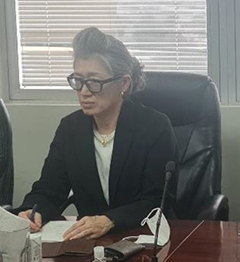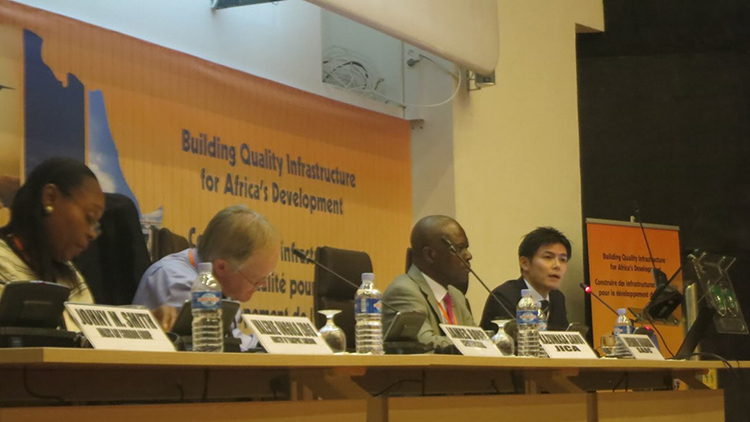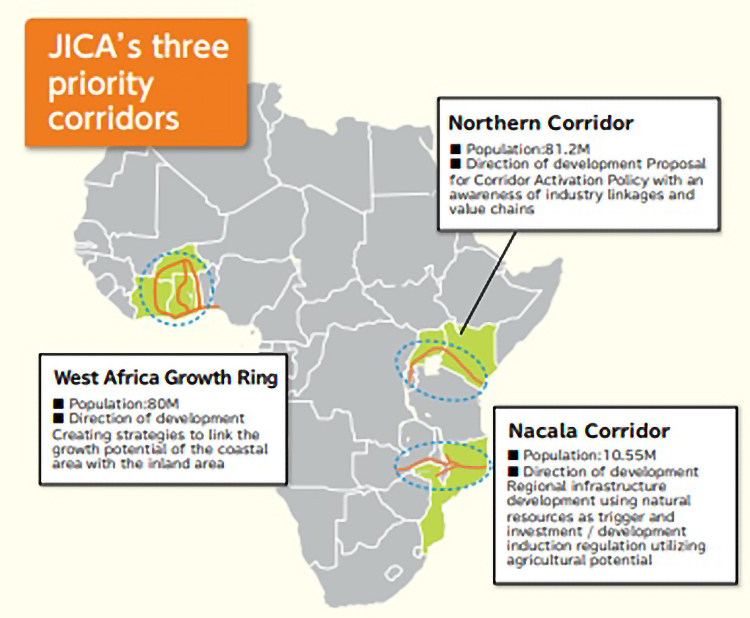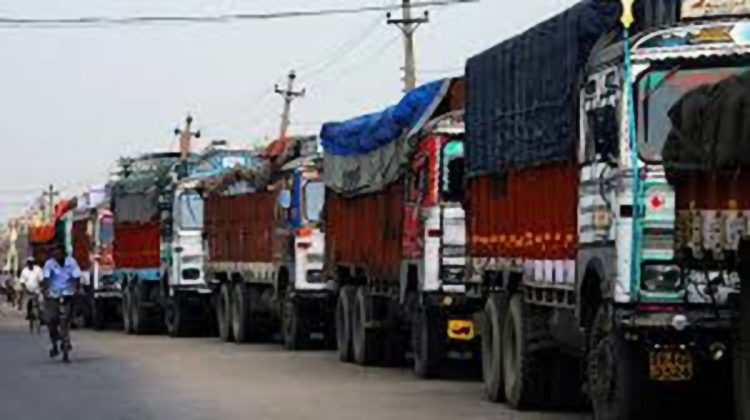Towards TICAD8: Africa's Corridors Break Down Barriers, Ensure Equitable Growth
August 23, 2022
With 16 landlocked countries in Africa, the development of infrastructure such as ports, roads and power transmission lines is critical to ensure that the fruits of growth can be more equitably felt. This can reduce disparities between coastal and inland areas, as well as between urban and rural areas.

Dr.TOKUORI Tomomi, Senior Advisor (Trade Facilitation), Governance and Peacebuilding Dept. at JICA
The environment and challenges surrounding "corridor development" have changed in recent years due to factors such as the launch of the African Continental Free Trade Area (AfCFTA), stricter border controls in response to the Global Pandemic, growing terrorist activities, and rising transport related costs caused by Russia's invasion of Ukraine. JICA's corridor development therefore needs to be upgraded in response, says Dr. TOKUORI Tomomi, who focuses on the soft aspects of corridor development at the Japan International Cooperation Agency (JICA).
By leveraging "digital transformation (DX)" and continuing to invest in human resources, Africa will be better able to reap the benefits of AfCFTA, which became operational in January 2021. AfCFTA aims to create a single market for goods and services, facilitate the movement of persons, promote industrial development and sustainable and inclusive socio-economic growth.
"JICA's future corridor development needs to seek approaches that create and complement synergies with current initiatives at the continental and regional levels, while keeping a close eye on progress in transport and trade facilitation using the latest digital technologies," says Dr. Tokuori.
The Eighth Tokyo International Conference on African Development (TICAD8), being held in the end of August in Tunisia, provides a platform to discuss such area as customs modernization, trade facilitation, technology and digitalization of freight transportation systems etc.

Right, Mr. SANUI Kazumasa, Deputy Director General and Group Director for Urban and Regional
Development, Infrastructure Management Dept. at the Japan International Cooperation Agency
Mr. SANUI Kazumasa, who engages in developing concepts and plans for corridor development at JICA, adds that corridors enable individual African countries that have small economies to work together, thus bringing about economies of scale and giving them the ability to negotiate with the rest of the world.
"Landlocked countries are dependent on their coastal neighbors for their trading ports and trade routes, which can easily lead to superiority-inferiority relations among them," he says. "In addition, the high cost of logistics makes landlocked countries more expensive and less conducive for the development of industries. We could be more strategic in enhancing connectivity of coastal-inland and urban-rural."
Development of corridors are hence crucial to achieving the goal of raising productivity among inland countries, while also lowering transportation costs of goods that are then exported to urban areas and beyond. Mr. Sanui says, "It is very important to stimulate intra-regional trade and two-way trade in goods and services within the regions that the corridors connect. This, we believe, is the essence of corridor development in Africa."

Dr. Towela Nyirenda JERE, the head of economic integration, AUDA-NEPAD
AUDA-NEPAD's head of economic integration Dr. Towela Nyirenda JERE says, "It becomes clear that sustainable, high-quality infrastructure is a must - transport infrastructure for cross-border trade; communications infrastructure for electronic services and communication; energy infrastructure to drive industries; as well as water and maritime infrastructure for transportation, logistics and sanitation."
"These corridors form a strong backbone for intra-regional, inter-continental and domestic trade and provide the link between regional centers of economic activity."
There are five growth corridor development areas throughout Africa, of which JICA has focused on three, namely:
- Northern Corridor: Connects Kenya to Uganda, Rwanda, Burundi and the eastern part of the Democratic Republic of Congo via a single road. Some arterial roads branch into South Sudan
- West Africa Growth Ring: Connects the coastal countries of Cote d'Ivoire, Ghana, and Togo, and the landlocked country of Burkina Faso.
- Nacala Corridor: Starting from the port of Nacala in Mozambique, the corridor connects to inland Malawi and Zambia.

JICA's three priority corridors in Africa; "Northern Corridor", "West Africa Growth Ring", and
"Nacala Corridor."
Bringing accessibility to millions
The Programme for Infrastructure Development in Africa (PIDA), Dr. Jere says, is Africa's "blueprint to ensure regional economic integration, boost industrialization and support intra-African trade".
JICA has been involved in several projects over the three priority corridors since TICAD V in 2013, by offering yen loans, grants, and technical cooperation schemes that cover both the hard and soft aspects of connectivity.
Hardware refers to development of logistics infrastructure such as ports, roads, bridges, border facilities, and special economic zones. Software, meanwhile, focuses on aspects such as the environment, institutional and legal reforms and human resource development.
There were 51 cross-border programs divided into 433 projects in the first PIDA Priority Action Plan that ended in 2020, in areas such as transport, energy, and information and communication technology. The second phase, which started in 2021 and will last until 2030, is now centered on 69 projects that were chosen to maximize job creation, enhance climate friendliness, and promote gender-sensitive infrastructure development.
So far, the PIDA has helped to add 16,066km of roads, 4,077km of railway lines, 3,506km of energy transmission lines, 7GW hydro-electric energy generation, submarine cables and regional fiber-optic cables providing global and intra-African connectivity, as well as 38 internet exchange points. Around 30 million people have gained access to electricity between 2013 and 2019.
With the financial and technical cooperation of JICA, priority One-Stop Border Posts (OSBPs, a concept to enable more efficient movement of people and goods by integrating border clearance and entry/exit formalities at a single location) have also been established under the PIDA, and with the contributions of various stakeholders, the third edition of the OSBP source book was launched in June 2022 as an operational guideline drawn from the accumulated practical lessons in the continent.
Dr.Tokuori adds that besides OSBPs, JICA has also been working on the capacity building of customs administration in Africa through the "JICA/WCO joint project" focusing on trade facilitation and customs modernization which contributes to smooth and effective implementation of AfCFTA.
Local stakeholders are likewise involved in promoting the full potential of the corridors. These include the Borderless Alliance, which was founded in 2011 and represents a private sector-led coalition to increase trade in West Africa.

Mr. Justin BAYILI, Executive secretary at Borderless Alliance
Executive secretary Mr. Justin BAYILI says that the alliance advocates for changes in policy and practice by public authorities and private operators - both at national and regional level - with a view to improving the business environment.
This, he adds, has contributed to a "better competitiveness of the corridors on which we intervene by reducing barriers such as road harassments and reducing border crossing times thanks to the presence of our Border Information Centers".
But he notes that West Africa does not have a corridor management authority unlike other parts of Africa, resulting in economic communities that are not aligned in their policies.
"The African Union should through its various projects and programs support West Africa to strengthen not only the legal framework for the creation of corridors, but also their management which involves the establishment of corridor management authorities," he says.

Nonetheless, there is consensus that an Integrated Corridor Approach will offer opportunities for "cross-sectoral, water-health-energy-food nexus projects that address post-pandemic economic recovery needs", Dr. Jere says.
"An effective network of regional corridors will ensure greater African integration, promote intra-African trade and enhance industrialization leading to sustainable and inclusive economic growth," she adds.
Noting that the future of infrastructure is green, she says: "We have the opportunity to shape the state of the world for years to come and we should seize it and act decisively."

